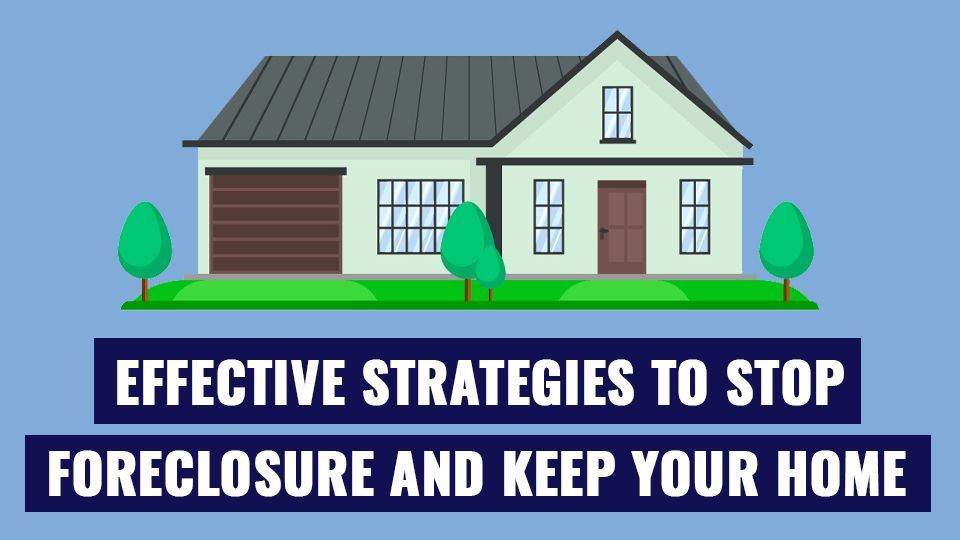10 Effective Strategies to Stop Foreclosure and Keep Your Home

Facing the threat of foreclosure can be a daunting and stressful experience. You’ve invested time, money, and emotions into your home, and the thought of losing it can be overwhelming. However, it’s crucial to remember that you have options to prevent foreclosure and keep your home.
This guide will walk you through effective strategies to stop foreclosure and protect your most valuable asset. By taking proactive steps and exploring various alternatives, you can increase your chances of staying in your home and regaining financial stability. Remember, the key is to act quickly and decisively to address the situation before it escalates further.
1. Contact Your Lender Immediately
When you’re facing potential foreclosure, your first step should be to reach out to your lender without delay. Many homeowners make the mistake of avoiding communication, but this can worsen the situation. Your lender may be more willing to work with you than you realize.
By contacting your lender, you open the door to potential solutions. Explain your financial hardship and demonstrate your commitment to resolving the issue. Your lender might offer options like temporary payment reductions or loan modifications to help you get back on track.
2. Apply for a Loan Modification
A loan modification can be an effective way to stop foreclosure by making your mortgage more manageable. This process involves changing the terms of your existing loan to lower your monthly payments.
Provide your lender with financial documentation, including income statements and expense reports. Your lender will review this information to determine if you qualify for a modification. If approved, they might lower your interest rate, extend your loan term, or even reduce your principal balance.
3. Request a Forbearance Agreement
A forbearance agreement can provide temporary relief if you’re experiencing short-term financial difficulties. This option allows you to pause or reduce your mortgage payments for a specific period, giving you time to improve your financial situation.
Contact your lender and explain your circumstances. If approved, you’ll agree on the terms, including how long the forbearance will last and how you’ll repay the missed amounts. Remember, a forbearance doesn’t erase what you owe; it simply postpones it.
4. Pursue a Repayment Plan
A repayment plan can help you catch up on missed payments without the need for more drastic measures. This option is particularly useful if you’ve fallen behind due to a temporary setback but are now able to resume regular payments.
Under a repayment plan, you’ll continue making your current mortgage payments while also paying an additional amount each month to cover the arrears. Your lender will work with you to determine a realistic amount based on your income and expenses. This approach allows you to gradually catch up over time, typically within three to six months.
5. Consider a Short Sale
If keeping your home is no longer feasible, a short sale could be a viable alternative to foreclosure. In a short sale, your lender agrees to let you sell your home for less than the amount you owe on your mortgage.
You’ll need your lender’s approval. Start by contacting them to discuss this option. If they agree, you’ll work with a real estate agent to list and sell your home. While a short sale will impact your credit, it’s generally less damaging than a foreclosure.
6. Explore a Deed In Lieu Of Foreclosure
A deed in lieu of foreclosure is another alternative to consider if you can’t keep your home. This option involves voluntarily transferring your property’s title to your lender in exchange for being released from your mortgage obligations.
Your lender will require you to provide financial information to prove that you can’t afford the home. If approved, you’ll sign over your property deed to the lender. While this will still affect your credit, it’s often less severe than a foreclosure.
7. File for Bankruptcy
While bankruptcy should be considered a last resort, it can be an effective way to stop foreclosure proceedings immediately. When you file for bankruptcy, an automatic stay goes into effect, halting all collection activities, including foreclosure.
There are two main types of bankruptcy for individuals: Chapter 7 and Chapter 13.
- Chapter 7 liquidates your assets to pay off debts.
- Chapter 13 allows you to reorganize your debts and create a repayment plan.
Consult with a bankruptcy attorney who can guide you through the process. While bankruptcy can provide a fresh start, it has long-lasting consequences on your credit, so carefully consider this option before proceeding.
8. Seek Assistance From Housing Counseling Agencies
Housing counseling agencies can be invaluable resources in your efforts to stop foreclosure. These organizations offer free or low-cost advice and can help you understand your options and rights as a homeown
Visit the U.S. Department of Housing and Urban Development (HUD) website. They maintain a list of approved counseling agencies across the country. A housing counselor can help you communicate with your lender, understand complex financial documents, and develop a plan to avoid foreclosure.
9. Refinance Your Mortgage if Possible
Refinancing your mortgage could potentially lower your monthly payments and help you avoid foreclosure. This option involves taking out a new loan to pay off your existing mortgage, ideally with better terms.
Apply with a lender, much like you did for your original mortgage. They’ll review your credit score, income, and current home value. If approved, you might secure a lower interest rate or extend your loan term, both of which could reduce your monthly payments. However, refinancing can be challenging if you’re already behind on payments or your home’s value has decreased.
10. Sell Your House As-Is for Cash
If other options aren’t viable, selling your house quickly for cash could be a way to avoid foreclosure. This approach involves selling your home in its current condition to a real estate investor or company that specializes in quick purchases.
Research companies in your area that buy houses for cash. Get multiple offers to ensure you’re getting a fair price. While you might not get as much as you would in a traditional sale, this method allows you to sell quickly and potentially walk away with some cash after paying off your mortgage.
Sell Your House Fast in St. Louis, Missouri
If you need to sell your house fast but don’t want the hassle of a traditional home sale, contact Klamen Real Estate Buyers. We buy houses as-is. No repairs are needed. Avoid closing costs and realtor commissions. Close in as little as seven days. Call (314) 721-6800 and get a fast cash offer from our local home buyers in Missouri.
Get Your Fair & Honest All-Cash Offer Today! No Obligations!
We will get back to you as soon as possible.
Please try again later.
By submitting this form, you agree to our Conditions of Use and Privacy Policy. You may receive both automated and personal text messages. Reply STOP at anytime to opt-out.


